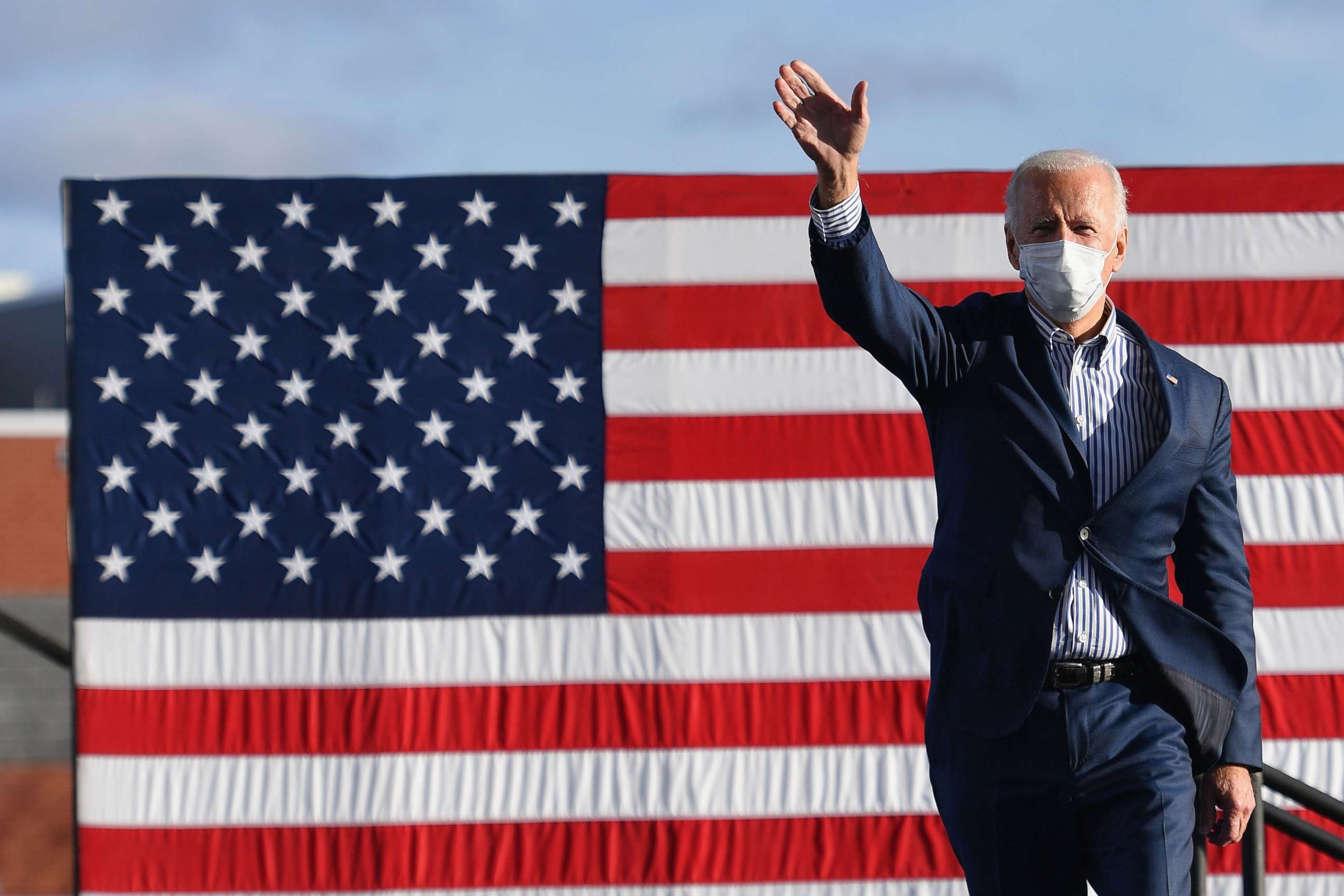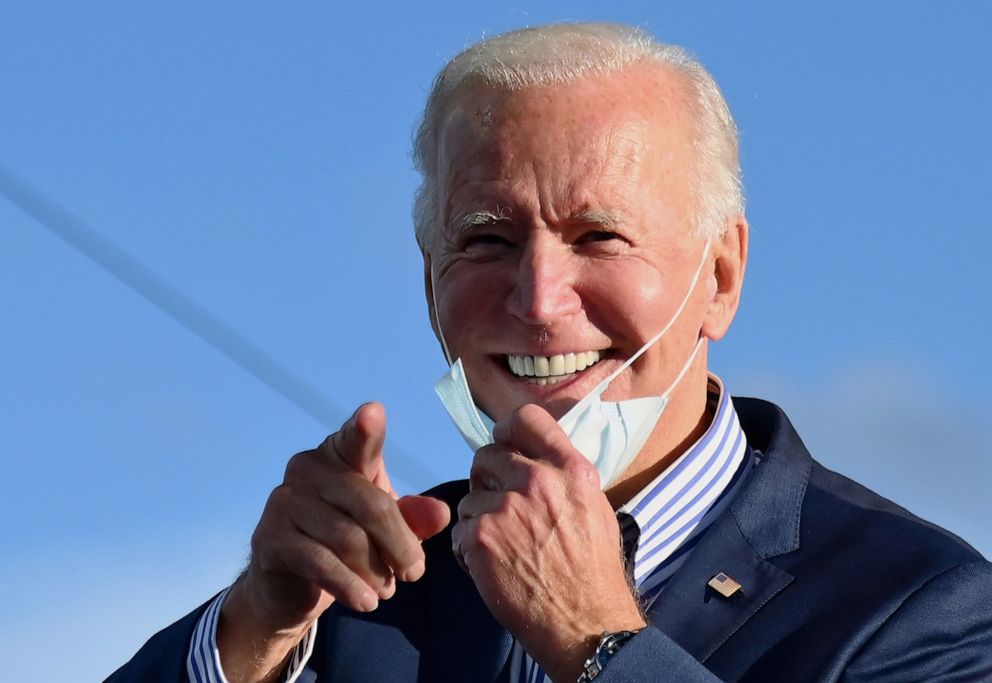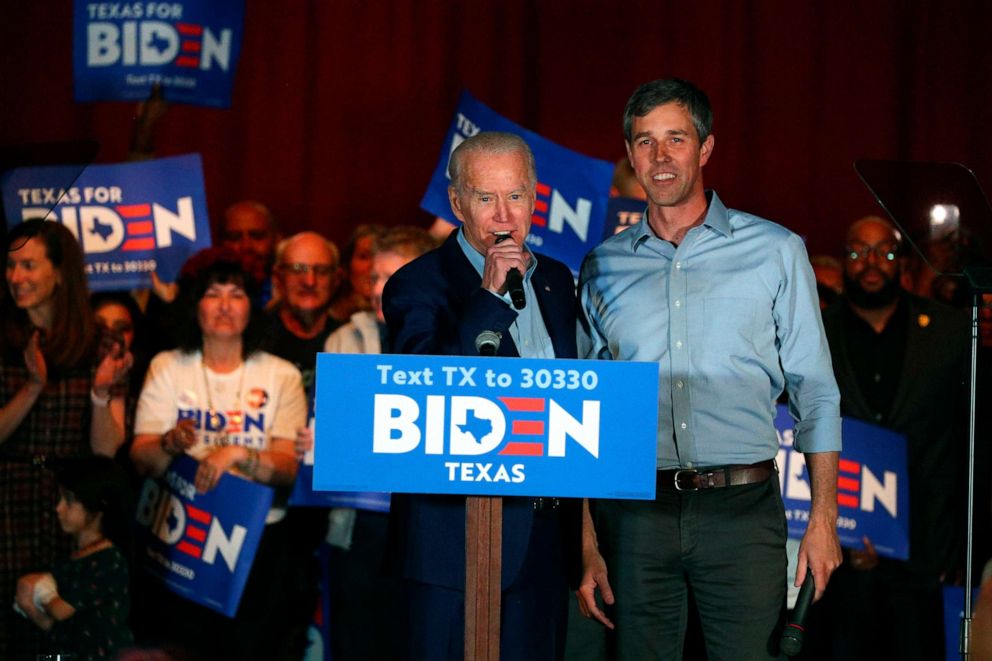Biden campaign eyes Georgia, Texas with 9 days left in campaign
The campaign enters the final swing with steady polls, cash-on-hand advantage.
It's the $100 million question: With a steady polling lead, a massive cash advantage and only nine days left to spend it, should Joe Biden go big or should he play it safe, following the hard-learned lessons of 2016?
In the final weeks of the general election, the Biden campaign has kept a steady focus on their six core battleground states of Pennsylvania, Michigan, Wisconsin, Arizona, North Carolina and Florida -- all states Hillary Clinton lost in 2016. That focus is expected to continue as Election Day draws closer.
But Biden's campaign is entering the home stretch in a position to spend, compared to President Donald Trump and the Republican Party, which burned through $1.4 billion of the more than $1.6 billion raised over the last two years.
The former vice president's campaign reported having $162 million in cash on hand by mid-October -- nearly four times the $43 million in cash on hand the Trump campaign reported. Overall, Biden and the Democratic party report having $331 million in cash on hand by Oct 14, compared to Trump and the GOP's $223.5 million.
The cash advantage is not lost on Biden's team.
"The resources that we have, have given us an opportunity to continue with an expansive map," Biden campaign national state director Jen Ridder said. "When I started in May, we laid out a 17-state battleground map and I expected it to shrink, and instead we've been able to keep all of the states on the map, but really know where our focus is."

The campaign is now signaling a last-minute push in some of those 17 states they've identified as opportunities to not just win back what was lost in 2016, but expand their pathway to 270 electoral votes and beyond.
Two of the states are Georgia and Texas, where polls this week show a tight race, and neither candidate polling above 50% in in Texas. That's led some allies in the Lone Star State to express frustration that the campaign hasn't done more to capitalize on their competitive position in the state a Democrat hasn't won since 1976.
"It would be so helpful to have the top of the ticket make an investment in Texas," former Democratic presidential candidate Beto O'Rourke, who endorsed Biden in March, told ABC News.
"Pennsylvania is an illustration of the law of diminishing returns: You can grow another hundred million in Pennsylvania and I don't know that it's going to move much more than the last hundred million did. You could invest 15 million, 10 million in Texas, and it would be catalytic," the former Texas congressman added.
While Biden himself has not yet visited the states during the general election, they haven't been ignored: The former vice president is set to visit Georgia on Tuesday, where he will give his "closing argument" for the 2020 race in Warm Springs. His running mate Sen. Kamala Harris traveled to the state on Friday, and a source familiar with her travel expects Harris to also make a trip to Texas soon. Harris' husband, Doug Emhoff, and Jill Biden have both made visits to the states as well.
"We have some good opportunities in states ... like Georgia and Texas," Ridder said.
That statement could set off alarm bells for some nervous Democrats, still haunted by the ghost of Clinton's 2016 campaign. But 2020 is not the same election: Biden is polling at 50% in Michigan, Wisconsin and Pennsylvania, according to FiveThirtyEights' polling average -- three states the president narrowly won in 2016 with less than 80,000 votes. Still Biden's campaign insists that the expansion won't come at the expense of their core battleground states.
"We're still entirely focused on those top six and that's the key to our path. But, you know, this election cycle is proving that we might have opportunities elsewhere and If we can spend a little extra time and a little extra money to push them over the edge I think we're willing to take that opportunity in the next 10 days," Ridder continued.

Biden's team is spending in those states. According to ad spending data from media research firm CMAG, Biden has so far invested $3.6 million in the expensive state of Texas, and $2 million in Georgia in the final two weeks of the campaign -- on par with what the campaign will put into Wisconsin and Ohio respectively in the same time frame.
Those totals are in addition to the more than $15 million Biden's campaign was investing on national ads in the 14 days leading up to the election, also likely to get eyeballs in the state.
All told, in the final month before Election Day, the campaign will put in $6 million in Texas and $5.6 million in Georgia on ads as of now.
"I think Texas is in the realm of possibility," ABC News Political Analyst Matthew Dowd said. "I would advocate if they can step it up -- step it up in Texas."
"People forget that Donald Trump only carried Texas by nine in 2016, Beto O'Rourke only lost Texas by 2.5% in 2018 and Texas -- in the registration and all the things that have been happening in Texas in the last two and four years, have all moved towards the Democrats," he continued.
Both states have seen high early voting turnout as the election inches closer: According to the United States Elections Project, between early in-person voting and vote by mail, more than 2.5 million ballots have been cast in Georgia and nearly 7 million have been cast in Texas -- more than 70% of the total ballots that were cast in that state in 2016.
While early voting can provide the campaign with some data on possible trends in the final stretch, the high level of engagement can also pose a new challenge for Biden's team on how and when to go big -- a challenge not seen in 2016.

"If the presidential campaign is going to invest, every single day matters because of vote by mail. Every day is Election Day," said Amanda Renteria, who served as national political director for Clinton during her 2016 presidential run.
"That piece puts a lot more pressure than I think we had in 2016, it puts a lot more pressure on the Biden campaign, because ... every day lost might be votes on that day that we missed."
But even with their cash stores, Renteria said the campaign has the added challenge of thinking beyond Nov. 3 when making their investments, given the possibility that a definitive winner does not emerge on election night.
"The traditional idea is you can spend all your money and not worry about the day after the election. That's just not the case here. There's a very real concern that you will have court cases afterwards. And you have to have the resources to be able to fight those," she added.
Still, O'Rourke argues Texas could play a pivotal role on election night if investments are made in the state.
"Texas will know the vote total on election night, by the way, Pennsylvania will not. Pennsylvania will take days to know their results. Texas could end this race for -- help him win on election night, and it can help us down ballot secure political power for the next decade in Texas. So this is a really important state on a number of levels."
ABC News' Soorin Kim contributed to this report.




